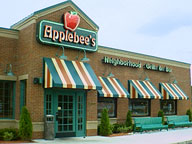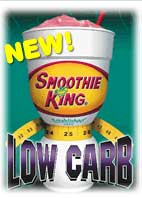
Vol. III, No. 10, November 2003
- Editor's Corner
- The Root Cause of Industry Roadkill
- A Reader's Reply to Last Month's Issue
- Own Part of an FEC Chain for $50
- A Stay-at-Home Mom's Quest for Edutainment
- A Mega-trend of Healthy Restaurant Food
- Birthday Party Tyranny
- Presidential Hopeful to Fight Video Games
- Meet Us at IAAPA
- Upcoming Institutes
- New Projects
A Mega-trend of Healthy Restaurant Food
USA Today calls it a nutritional tsunami. We wouldn't go quite that far. But we would call it a healthy eating mega-trend. Not only are Americans starting to eat healthier, but restaurants are responding by offering healthier fare.
It wasn't that many moons ago when the restaurant industry and many theme parks tried offering healthier foods. For example, back in 1991 McDonald's introduced the 91-percent fat-free McLean Deluxe. If you remember, it and many other choices went over like a lead balloon. Restaurant and theme park patrons shunned low-fat and low-calorie foods as if the edibles were made of cardboard, which is how many of them tasted. However, things are different now, particularly as there has been a change in American's eating habits. It used to be that going out to eat was a big treat. Today, Americans eat in restaurants over 200 times a year on average. Barbara Caplan, a partner in Yankelovich Partners, a national marketing consultancy specializing in lifestyle trends, puts it this way: "Now, it's not necessarily a big treat. When it's not so special, when it's more routine, you're more inclined to think about the nutritious quality of what you're eating." Glad Markunas, Senior VP of consumer insights and strategic branding at Burger King, notes, "It's not just the aging baby boomers, who might need to watch their health for other reasons. It's consumers in the twenties as well."
A 2003 survey by Yankelovich Partners found that 35% of women are reducing fat in their diets. Women are the nutritional gatekeepers for their families. So the way women go, so goes the family.
According to the NPD Group, a consumer trends research organization, 61% of the American adult population would like to lose 20 pounds. Their statistics also show that 5% of the US population is committed to a low-fat diet, 1 percent is on a low-carb diet and 8 percent are on a nonspecific weight loss diet.
Healthy eating is suddenly hot, with both the public and with restaurant chains. Have any doubts about how restaurants are modifying their menus for this mega-trend? Here is some of the evidence.
- McDonald's introduction of premium salads has contributed to the chain's turnaround in per store sales. The company is testing apple slices and milk options for Happy Meals and apple juice in the drink dispensers. It's starting a Healthy Lifestyles initiative to try to sell kids on balanced eating and exercise, running ads on children's TV with a character named Willie Munchright. All white-meat Chicken McNuggets with less fat and calories is being introduced. The McDonald's Operators Association of Southern California has added a whole-wheat grilled chicken sandwich, fajita and a McVeggie burger. McDonald's is also testing an adult Go Active! Happy Meal with a salad and a bottled water or drink that will include a free pedometer and an exercise booklet written by Oprah Winfrey's personal trainer, Bob Green. McDonald's restaurants in New York, New Jersey and Connecticut plan to launch menus in January for people following low-fat, low-calorie or low-carbohydrate diets.
- Jack-in-the-Box is now flipping turkey patties.
- Wienerschnitzel has launched a line of fat-free hot dogs.
- Wendy's was the original fast-food pioneer of premium salads, which now account for 12% of all sales. The company is beginning a 420-unit test of new low-fat options for the Kids' Meals, including a melon cup that can be ordered in place of fries and milk in either 2%-fat or 1% chocolate that can replace soda.
- Burger King's new Santa Fe Chicken Baguette includes peppers, onions and salsa on a French roll with only 4 grams of fat. Burger King Canada, with more than 350 units, has added low-fat combo meals boasting fewer than 7 grams of fat.
- Pizza Hut introduced the Fit 'N Delicious pizza with 25% less fat than its comparable Thin 'N Crispy pizza and only 150 calories per slice compared to 450 calories per slice from Stuffed Crust Pizza.
 Applebee's
has licensed the Weight Watchers label to brand seven to 10 low-calorie
healthy meal offerings with the Weight Watchers point tally on the menu.
Applebee's
has licensed the Weight Watchers label to brand seven to 10 low-calorie
healthy meal offerings with the Weight Watchers point tally on the menu.- Outback Steakhouse is rolling out smaller steak portions as a supplement to current portion sizes.
- Chili's, one of the earlier healthy food pioneers, is continuing to expand the low-fat Guiltless Grill menu selections, most recently adding a guiltless tomato basil pasta.
- Don Pablo's is launching a low-carbohydrate fajita line and a low-carb margarita.
- Ruby Tuesday is testing a combination of specially designed menu sections under such categories as low-calorie, low-carbohydrate and low-fat.
- Taco Bell introduced a lower-fat and lower-calorie menu option called Fresco Style.
- T.G.I. Friday's is developing a dozen or so high-protein/low-carb selections.
- Blimpie is introducing a new low-carbohydrate menu featuring four sandwiches and two salads, which will also include low-carbohydrate Cruncher Chips and dressings from Atkins Nutritionals, Inc.
- Subway was a pioneer of healthy food with its line of subs containing less than 6 grams of fat. Now fruit juice and fruit roll-ups have replaced soda and cookies in the Kids' Pak meal.
- KFC is stuffing its children's laptop boxes with applesauce and fruit snacks.
-
 Smoothie
King is introducing a low-carbohydrate/high-protein smoothie in
its more than 325 stores nationwide.
Smoothie
King is introducing a low-carbohydrate/high-protein smoothie in
its more than 325 stores nationwide. - Au Bon Pain now offers Trans-Fat-Free Muffins.
- Hardee's has introduced a bunless burger that comes wrapped in lettuce.
- Panera's is testing three whole-grain breads with fewer
carbohydrate grams per slice.
Restaurants aren't the only consumer businesses changing their ways to cater to American's desire for healthier food. A new concept of supermarket has emerged -- low-carbohydrate supermarkets. The concept started in California with Castus Low Carb Supermarkets, followed by Healthy Lifestyles and Carb Cutters supermarkets. There are now over 200 of these markets nationwide. Low-carb offerings are also starting to creep into mainstream supermarkets. Safeway is planning to increase low-carb offerings in its 1,700 stores. Now there is even low-carb beer with Michelob's low-carb Ultra beer. And Russell Stover has introduced a line of low-carb candies.
There is a big difference, of course, between consumers saying they want healthier food and actually buying it. In addition to anecdotal evidence from the popularity of the offerings at fast causal restaurants and new fast food offerings such as Wendy's and McDonald's salads, at least one study indicates

Is this now on former President George Bush, Sr.'s plate?
Americans are actually eating healthier. A 2003 study of the eating patterns of 5,000 people over 14 days by the NPD Group found that people are eating fresh fruit 6% more often and vegetables 5% more often than a year ago. And salad consumption at restaurants grew to 12% of all meal occasions from 10% in 2002. This reverses a decade-long decline in healthy eating based upon NPD's annual surveys. Who knows, these statistics might reflect that former President George Bush, Sr., has starting eating his broccoli.
So if healthy eating is a mega-trend and here to stay, what are the implications for location-based leisure destinations? Simple. Get with it or lose business. If just about every restaurant chain out there is catering to American's desires for healthier options, that definitely sets consumers expectations. So if your facility continues to offer pizza, fries, hamburgers, nachos -- you know, the traditional fare -- a large number of guests are going to bypass your food and go elsewhere. And if it's moms who are concerned about having their children eat healthier, they might not even want their children to visit your facility and be tempted by grease and fat. Heck, years ago, even before this mega-trend got underway, Chuck E. Cheese's saw that at least some moms weren't into pizza and put salad bars in all locations.
As we have been writing in past issues, it's time for the location-based entertainment industry to reinvent itself to be more relevant to the modern consumer. This includes taking food seriously and offering a more varied menu with some healthy and parent (mom) appealing fare.
Vol. III, No. 10, November 2003
- Editor's Corner
- The Root Cause of Industry Roadkill
- A Reader's Reply to Last Month's Issue
- Own Part of an FEC Chain for $50
- A Stay-at-Home Mom's Quest for Edutainment
- A Mega-trend of Healthy Restaurant Food
- Birthday Party Tyranny
- Presidential Hopeful to Fight Video Games
- Meet Us at IAAPA
- Upcoming Institutes
- New Projects


